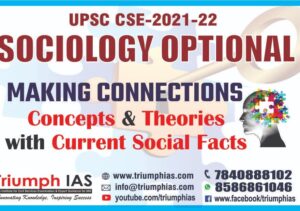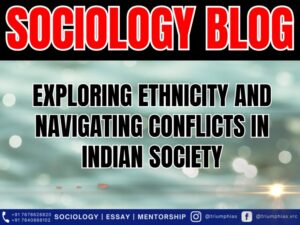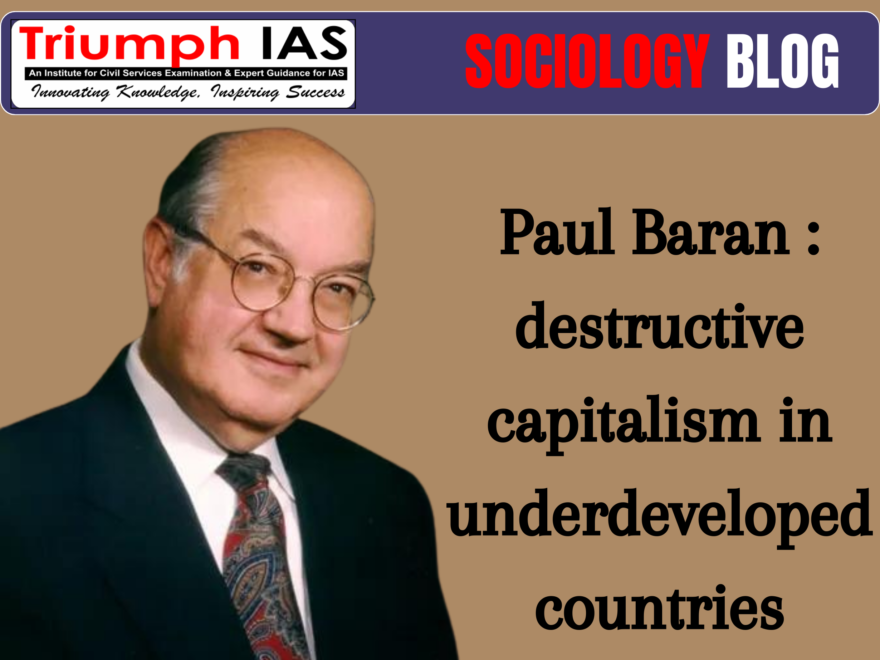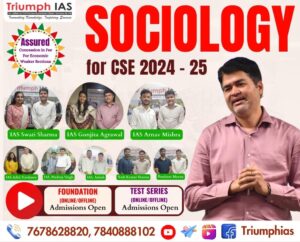Paul Baran : destructive capitalism in underdeveloped countries
Relevant for Sociology Optional for Civil Service Examination.
Sociology Paper -1
Unit 10 : Social Change in Modern Society
Paul Baran : destructive capitalism in underdeveloped countries
- Marx believed that capitalism is characterized by creative destruction. It has two effects: destruction, and regeneration. Paul Baran emphasized the destruction side of capitalism in underdeveloped countries.
- He did not find evidence of regeneration. Rather, the monopoly capitalism of the twentieth century, unlike the competitive capitalism of the nineteenth century, had a vested interest in maintaining backwardness and dependence in the periphery. Baran’s analytical contribution led to the flowering of the pessimistic and stagnationist school of dependency in Latin America and Africa.
- Baran’s favourite example of the destructive effects of capitalism was that of India. He found that Indian social scientists, having experienced British imperialism, had developed concepts very similar to the dependency theorists of the late nineteenth century. Baran’s theoretical point of departure was an analysis of economic surplus. He defined economic surplus as the mass of resources (actual and potential) which a society could have at its disposal, in order to facilitate economic growth. It is the amount that might be reinvested in productive ways to increase the future level of social output. This surplus is the residual from total income after society’s basic needs for food, clothing, shelter, and human companionship have been met.
- But, this surplus may be grossly misused. It may be utilized to erect sumptuous and multiple residences for the rich, or it may be wasted through a variety of ways of conspicuous consumption. The military, or the church may make tremendous demands on the surplus, or it may be drained away by foreign power via plunder, or, by simple profit repatriation as a result of foreign control over less developed countries. The historical analysis made by Baran makes it clear that the sources of poverty of less developed countries are found in the extraction of this surplus under colonialism. Thus, colonialism blocked the potential for change.
- Backwardness and poverty is perpetuated in these regions. According to him, the oppression of the feudal lords was ruthless, but tempered by tradition. It was further worsened by the domination of both foreign and domestic capitalists.
- According to dependency theory, the exploitation of the people is multiplied because the oppression and violence inherited from the feudal past is combined with the rationality and intelligent rapacity of the capitalists. The fruits of capitalism were not to raise productive wealth in many countries such as India. These fruits went abroad and served to support a parasitic bourgeoisie at home. People lived in abysmal misery, and they had no prospect of a better future. Poverty and underdevelopment continued. They lost their time honoured means of livelihoods, their arts and crafts.
- There was no modern industry to provide new ones in their place. They were thrust into extensive contact with the advanced science of the west, yet they remained in a state of darkest backwardness. By reviewing the history of colonialism, Baran made the following conclusions
- profit margins fall due to the workers demand for higher wages
- foreign capital becomes the targeted source of increasing state revenue (by imposing higher taxes and higher royalty payments, for example)
- foreign exchange control is imposed to curb the funds flowing out of the country as repatriated profits
- tariffs on imported wage goods are imposed to protect domestic manufacturing.
- Theoretically speaking, the state could break this deadlock by opting for new programmes that-would make import substitution industrialization (ISI) more successful and dynam But the state, in the backward regions, is incapable of making the decisions needed to move forward on any front of development ladder.
- Baran argued that political revolution is necessary to break this pattern. He argued that by following the capitalistic route, these countries are not expected to achieve Rostow’s stage of ‘high mass consumption’.
- Instead, these countries would head towards their economic and social graveyards. Thus, by following the socialistic route, the less developed countries could reasonably expect some relief from poverty.
Reference: Static Portion
Related Blogs…
 |
 |
Frequently Asked Questions:
1. Question: Define the term “ethnic movement” and provide an example from India.
Answer: An ethnic movement refers to a collective effort by a group sharing common cultural, linguistic, or religious traits, seeking to assert their identity and rights; an example from India is the Khalistan Movement in Punjab.
2. Question: Identify the main objectives behind the Gorkhaland ethnic movement.
Answer: The Gorkhaland ethnic movement primarily seeks to establish a separate state for India’s Nepali-speaking population in the Darjeeling region, advocating for linguistic and cultural recognition and political autonomy.
3. Question: What was the Operation Blue Star, and which ethnic movement was it related to?
Answer: Operation Blue Star was a military action in 1984, aiming to remove Sikh militants hiding in the Golden Temple in Amritsar; it is related to the Khalistan movement, which sought a separate Sikh country.
4. Question: Mention a critical factor that triggered the emergence of ethnic movements in India, as discussed by Dipankar Gupta.
Answer: Dipankar Gupta emphasized that ethnicity is fundamentally a political process, wherein caste and religion, the key components of identity formation, are politicized by leaders for vested interests.
5. Question: What were the primary reasons for the Assam Ethnicity conflicts involving Bodo tribals and Bengali Muslim settlers?
Answer: The Assam Ethnicity conflicts primarily stemmed from issues related to immigration, land rights, and resource allocation, leading to clashes, riots, and evolving relationships among indigenous communities to address challenges.
6. Question: Briefly describe the role of the Dravidian Movement in terms of caste and societal structure.
Answer: The Dravidian Movement, led notably by E.V. Ramasamy, aimed to establish an egalitarian society, focusing on anti-Brahmanism and advocating for equal rights for backward castes, while also introducing reforms like self-respect marriages.
7. Question: Name the prominent ethnic movements in North-East India and specify one common objective.
Answer: Prominent ethnic movements in North-East India include the Nagas’ and Mizos’ struggles; a common objective was to gain autonomy and recognition for their distinct tribal identities and cultural uniqueness.
8. Question: What is the key argument of Gail Omveldt regarding traditional Indian society and multiculturalism?
Answer: Gail Omveldt opposed romanticizing traditional Indian society, arguing that hierarchy has always dominated it and dismissing the notion that multiculturalism is an intrinsic feature of Indian society as a myth.
9. Question: Briefly explain the social hierarchy factor as a contributing element to ethnic movements as suggested by Olzak.
Answer: Olzak suggests that the construction of hierarchies among ethnic communities, which often leads to the suppression of one group by another, is a key factor that can instigate social and ethnic movements.
10. Question: Identify one consequence of the unequal economic development factor within the context of ethnic movements in India.
Answer: One consequence of unequal economic development is the marginalization and underdevelopment of certain groups, leading to feelings of alienation and sometimes initiating ethnic movements as these groups strive for equality and recognition.
GS Related Practices Questions…
To master these intricacies and fare well in the Sociology Optional Syllabus, aspiring sociologists might benefit from guidance by the Best Sociology Optional Teacher and participation in the Best Sociology Optional Coaching. These avenues provide comprehensive assistance, ensuring a solid understanding of sociology’s diverse methodologies and techniques.
META TAGS:
Ethnic Movements, ethnic movements in india, ethnic movement in sociology, Punjab Movement, North-East Ethnic Movements, Gorkhaland Movement, Dravidian Movement, Assam Ethnicity, Ethnic Conflicts, Sociopolitical Impact, India, Ethnic Consciousness, Ethnic Rights, Political Crisis, Economic Development, Cultural Disparities, Khalistan Movement, Nagaland, Mizoram, Multiculturalism, Political Economy, Identity Formation, Social Hierarchies, Bodo Tribals, Bengali Muslim Settlers, Anti-Sikh Riots, Operation Blue Star, Unequal Development, Ethnic Violence, Political Mobilization

Why Vikash Ranjan’s Classes for Sociology?
Proper guidance and assistance are required to learn the skill of interlinking current happenings with the conventional topics. VIKASH RANJAN SIR at TRIUMPH IAS guides students according to the Recent Trends of UPSC, making him the Best Sociology Teacher for Sociology Optional UPSC.
At Triumph IAS, the Best Sociology Optional Coaching platform, we not only provide the best study material and applied classes for Sociology for IAS but also conduct regular assignments and class tests to assess candidates’ writing skills and understanding of the subject.
Choose The Best Sociology Optional Teacher for IAS Preparation?
At the beginning of the journey for Civil Services Examination preparation, many students face a pivotal decision – selecting their optional subject. Questions such as “which optional subject is the best?” and “which optional subject is the most scoring?” frequently come to mind. Choosing the right optional subject, like choosing the best sociology optional teacher, is a subjective yet vital step that requires a thoughtful decision based on facts. A misstep in this crucial decision can indeed prove disastrous.
Ever since the exam pattern was revamped in 2013, the UPSC has eliminated the need for a second optional subject. Now, candidates have to choose only one optional subject for the UPSC Mains, which has two papers of 250 marks each. One of the compelling choices for many has been the sociology optional. However, it’s strongly advised to decide on your optional subject for mains well ahead of time to get sufficient time to complete the syllabus. After all, most students score similarly in General Studies Papers; it’s the score in the optional subject & essay that contributes significantly to the final selection.
“A sound strategy does not rely solely on the popular
Opinion of toppers or famous YouTubers cum teachers.”
It requires understanding one’s ability, interest, and the relevance of the subject, not just for the exam but also for life in general. Hence, when selecting the best sociology teacher, one must consider the usefulness of sociology optional coaching in General Studies, Essay, and Personality Test.
The choice of the optional subject should be based on objective criteria, such as the nature, scope, and size of the syllabus, uniformity and stability in the question pattern, relevance of the syllabic content in daily life in society, and the availability of study material and guidance. For example, choosing the best sociology optional coaching can ensure access to top-quality study materials and experienced teachers. Always remember, the approach of the UPSC optional subject differs from your academic studies of subjects. Therefore, before settling for sociology optional, you need to analyze the syllabus, previous years’ pattern, subject requirements (be it ideal, visionary, numerical, conceptual theoretical), and your comfort level with the subject.
This decision marks a critical point in your UPSC – CSE journey, potentially determining your success in a career in IAS/Civil Services. Therefore, it’s crucial to choose wisely, whether it’s the optional subject or the best sociology optional teacher. Always base your decision on accurate facts, and never let your emotional biases guide your choices. After all, the search for the best sociology optional coaching is about finding the perfect fit for your unique academic needs and aspirations.
To master these intricacies and fare well in the Sociology Optional Syllabus, aspiring sociologists might benefit from guidance by the Best Sociology Optional Teacher and participation in the Best Sociology Optional Coaching. These avenues provide comprehensive assistance, ensuring a solid understanding of sociology’s diverse methodologies and techniques. Sociology, Social theory, Best Sociology Optional Teacher, Best Sociology Optional Coaching, Sociology Optional Syllabus.
Best Sociology Optional Teacher, Sociology Syllabus, Sociology Optional, Sociology Optional Coaching, Best Sociology Optional Coaching, Best Sociology Teacher, Sociology Course, Sociology Teacher, Sociology Foundation, Sociology Foundation Course, Sociology Optional UPSC, Sociology for IAS,
Follow us :
🔎 https://www.instagram.com/triumphias
🔎https://www.youtube.com/c/TriumphIAS
🔎https://t.me/VikashRanjanSociology
Find More Blogs…
| Compare and contrast Karl Marx’s and Max weber’s | Karl Marx- Historical Materialism |
| Talcott Parsons : Social system | Scope of the subject and comparison with other social sciences |
KEYWORD: Destructive Capitalism, Destructive Capitalism, Destructive Capitalism, Destructive Capitalism Destructive Capitalism, Destructive Capitalism, Destructive Capitalism, Destructive Capitalism, Destructive Capitalism, Destructive Capitalism, Destructive Capitalism, Destructive Capitalism, Destructive Capitalism, Destructive Capitalism


